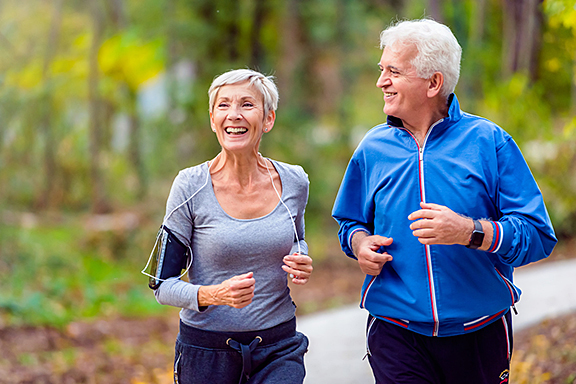It’s Never Too Late to Start
Have you given up on exercise? A lot of older people do. In fact, just one out of four people between the ages of 65 and 74 exercise regularly. Many people assume that they’re too out-of-shape, too sick, too tired, or just too old. Starting or maintaining a regular exercise routine can be a challenge at any age and it’s true that as you get older you may have additional concerns. However, despite our cultural depictions of aging, we all have the ability to age well with the strength, agility and balance to maintain our quality of life and the activities we enjoy.
Exercise can help make you stronger, prevent bone loss, improve balance and coordination, lift your mood, boost your memory and ease the symptoms of many chronic conditions. It can also boost your energy, build confidence, protect your heart and help maintain your independence.
Let’s squash some of the myths that hold seniors back from moving forward with their fitness goals.
Myth 1: A decline in old age is inevitable. There’s no point in exercising.
There’s a powerful myth that getting older means getting decrepit. It’s not true. Some people in their 70s, 80s, and 90s are out there running marathons and becoming body-builders. A lot of the symptoms that we associate with old age – such as weakness and loss of balance – are actually symptoms of inactivity, not age.
Myth 2: Exercise isn’t safe for someone my age. It puts me at risk of falling.
Studies show that exercise can actually reduce your chances of a fall. Regular exercise will help build strength, stamina, balance and agility. Exercises like tai chi may be especially helpful in improving balance. If you are concerned about osteoporosis and weak bones, regular exercise is one of the best ways to strengthen them.
Myth 3: It’s too frustrating. I’ll never be the athlete I once was.
Changes in hormones, metabolism, bone density and muscle mass mean that strength and performance levels inevitably decline with age, but that doesn’t mean you can no longer derive a sense of achievement from physical activity. The key is to set fitness goals that are sensible for your age. A sedentary lifestyle will take a much greater toll on athletic ability than biological aging.
 Myth 4: I’m too old. I need to check with my doctor before I exercise.
Myth 4: I’m too old. I need to check with my doctor before I exercise.
You’re never too old to start an exercise program! In fact, adults who become active later in life often show greater physical and mental improvements than their younger counterparts.
If you have a medical condition or any unexplained symptoms, check with your doctor before you start exercising. Otherwise, I’m sure your doctor will be more than thrilled to hear you’re staying active! Just start slowly and don’t overdo it. Consider doing a few sessions with a certified fitness professional to make sure you are using proper form and doing things correctly.
Myth 5: I’m sick, so I shouldn’t exercise.
On the contrary, if you have a chronic health problem such as arthritis, diabetes or heart disease exercise is almost certainly a good idea.
Exercise is almost like a silver bullet for lots of health problems. For many
people, exercise can do as much if not more good than the five or more
prescription medications they take every day.
Myth 6: I’m afraid I might have a heart attack.
We’ve all heard about people who have had a heart attack while exercising. It can happen. However, the many health benefits of exercise far exceed the small risk. Being a couch potato is far more dangerous than being physically active.
Myth 7: I never really exercised before.
It’s too late to make a difference in my health. It may seem too late to compensate for a lifetime of not exercising. Studies have found that starting an exercise routine can boost muscle strength even for people in their nineties. Other research shows that starting exercise late in life can cut the risk of health problems such as diabetes and improve symptoms related to many health-related conditions.
Myth 8: Exercise will hurt my joints.
If you’re in chronic pain from arthritis, exercising may seem too painful. Studies show that exercising helps with arthritis pain. One study found that people over the age of 60 with arthritis in the knees actually had less pain and better joint function when they exercised more.
Myth 9: I don’t have time.
This is a myth that’s common in all age groups. Experts recommend a minimum of 150 minutes of aerobic exercise a week. That might sound like a lot. Actually, it’s only a little over 20 minutes a day. Remember, you don’t have to do it all at the same time. You can take a 10-minute walk in the morning and pedal on a stationary bike for 15 minutes in the evening.

Myth 10: I’m disabled, so I can’t exercise.
A disability can make exercise challenging, but there really is no excuse for not doing some sort of exercise. Almost any exercise can be modified to work around
your disability. If you’re in a wheelchair, you can lift light weights, stretch, and do chair aerobics, chair yoga, and chair Tai Chi to increase range of motion, build strength, improve muscle tone and flexibility and promote cardiovascular health. In addition, many swimming pools offer access to individuals in a wheelchair and there are adaptive exercise programs for wheelchair sports such as basketball.
Myth 11: I can’t afford to join a gym. Exercise equipment is too expensive.
Gym memberships and home treadmills can be expensive. Still, that’s no reason
to skip out on a workout. There are lots of ways to get fit at a low or no cost. Walking doesn’t cost anything. You can also look into free demonstration classes at your local senior center. If you want to lift weights at home, use soup cans or milk jugs filled with sand. Use your dining room chair for exercises that improve balance and flexibility. If you have a health problem, your insurance may cover a gym membership or a few sessions with a personal trainer.
In Conclusion:
No matter your age or physical condition, it’s never too late to start! Do something that YOU enjoy doing! Being more active can improve your health, boost your energy, relieve stress, improve your overall sense of well-being and help you manage symptoms of illness and pain.
Exercise is the ticket to living well into your golden years! Getting and staying active is not just about adding years to your life, it’s about adding life to your years. Good luck to you.

Active group of seniors doing gymnastics class together in the park










